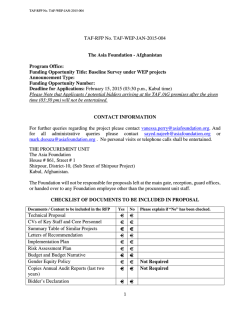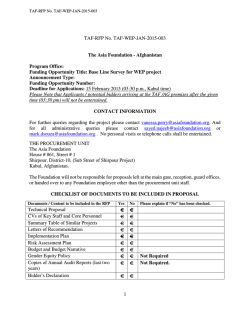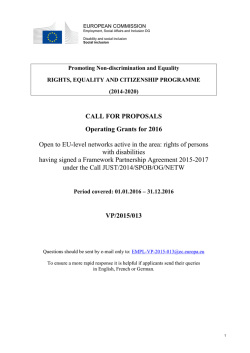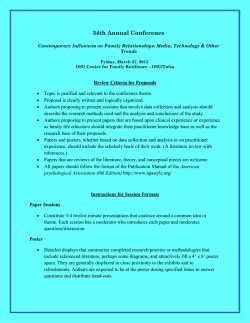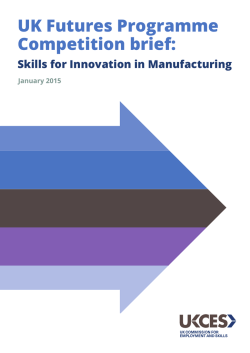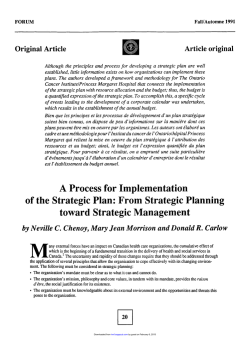
AAL Call 2015 text
Call for proposals AAL 2015 Active and Assisted Living Programme Challenge-Led Call for Proposals AAL 2015 LIVING ACTIVELY AND INDEPENDENTLY AT HOME Support more older adults to live longer in their homes with the contribution of ICT based solutions Date: Version: Status: 1 26 February, 2015 V1 Published1 Please always check for the last official version on the web-site. 26 February 2015 1/9 Call for proposals AAL 2015 Contents The AAL Programme.................................................................................................................. 3 Rationale ................................................................................................................................... 4 Call challenge ............................................................................................................................ 4 Expected Impact ........................................................................................................................ 4 Requirements for Solutions Proposed in response to Call 2015............................................... 5 Evaluation procedure and funding allocation ........................................................................... 6 Basic Information on Call AAL 2015 .......................................................................................... 6 Characteristics of AAL Programme Projects.............................................................................. 6 Consortium-level Eligibility Criteria ........................................................................................... 7 National Eligibility Criteria......................................................................................................... 7 Guide for Applicants .................................................................................................................. 7 AAL Partner States Participation ............................................................................................... 9 26 February 2015 2/9 Call for proposals AAL 2015 Active and Assisted Living Programme Challenge-Led Call for Proposals 2015 AAL 2015 "Living actively and independently at home” Support more older adults to live longer in their homes with the contribution of ICT based solutions. The AAL Programme The AAL Programme is a common funding activity of member states of the AAL Association, with the financial support of the European Commission, based on article 185 of the Treaty on the Functioning of the European Union. The aim of the AAL Programme is to provide innovative ICT-based solutions including products, systems or services to enhance older adults’ quality of life and to strengthen the industrial base in Europe. The main goal is improving the autonomy, participation in social life, skills, and employability of older adults2. Solutions funded under the AAL Programme address identified wishes and needs of the end-users, are transnational, collaborative and cost-shared between private and public funding. AAL projects aim at introducing their solution to the market within a maximum of 2-3 years after finalisation of the project. The first phase of the AAL Programme already funded 150 thematic projects in 6 calls since 20083. The AAL Programme continues with “challenge led” calls. This enables a more open approach to the development of ICT-based solutions in response to the individual and societal challenges as drivers of innovation and economic growth. The AAL Programme calls are complementary to the Horizon 2020 calls related to Active and Healthy Ageing under Societal Challenge 1 (SC1)4. 2 See the sections entitled “Framework for ‘End-user Involvement’ under the AAL Programme” and “Guideline for Ethical Considerations in AAL Projects” in the Guide for Applicants 3 The proposals are strongly encouraged to check the list of project in http://www.aal-europe.eu/our-projects/ 4 http://ec.europa.eu/programmes/horizon2020/en/h2020-section/health-demographic-change-and-wellbeing 26 February 2015 3/9 Call for proposals AAL 2015 Rationale Demographic change is one of the major challenges facing Europe: The proportion of older adults in our societies is rapidly increasing, due to low birth rates, ageing “baby-boomers”, and rising life expectancy. It is forecasted that in 2060 the number of people over 65 years will grow to 29.5% of the total population5. Most adults prefer to age in place. That is: to remain in the home6 of their choice as long as possible. Many older adults face challenges related to coping with daily life activities and making decisions when they live independently – especially when living alone - with limited or no help at all. Information and communication technologies (ICT) can become important enablers for older adults to achieve their full capacities to stay active and live independently. To this end, it is crucial that AAL solutions are user friendly, accessible and widely available on the market. In the course of life, individuals’ perception of necessities, priorities and quality of life changes and this can have a direct impact upon consumption patterns. The provision and acquisition of products and services should be tailored to the desires, needs and economic welfare of older adults. In this sense the silver market can be an opportunity for economic growth. Call challenge The 2015 Call Challenge of the AAL Programme aims to fund ICT based innovative, transnational and multi-disciplinary collaborative projects with a clear market orientation that support older adults to live: Independently for longer, meaning with as little (professional) help as possible and with choice and control over the decisions, equipment and assistance. Actively in the sense of staying in charge of their own lives and participate in society the way they want. The key priority for the projects should be to provide and to pilot ICT-based solutions that will support older adults in their homes which: Integrate existing technologies or develop technologies and infrastructures into easy to use, affordable and sustainable solutions that address a range of needs Have a high potential to be commercialised and scalable. Expected Impact ICT-based solutions in this call are expected to sustain or improve the capacity of older adults for: - Living an active life (social participation and wellbeing). - Living independently for longer at home (decision and control of daily activities) with support from their social network/community when necessary. ICT-based solutions in this call are expected to contribute to: 5 http://ec.europa.eu/social/main.jsp?catId=1062&langId=en Home(s): Homes of older adults (rented or in property) where they develop their everyday lives and activities. Homes where older adults live independently in a non-institutional setting. 6 26 February 2015 4/9 Call for proposals AAL 2015 - A large(r) use of ICT/technology in the homes of older adults. A growing public and consumer market of interoperable and scalable AAL services and products to support active and independent living of older adults at home. The facilitation of new European cooperation, including end-users and different stakeholders in the value chain. Savings for the social/care system as people live independent in their homes for longer and delaying the move to institutionalized care. Applicants must outline the key indicators measuring the impact of the ICT-based solution in terms of the targeted objective as well as the methodology used to collect the related data. Requirements for Solutions Proposed in response to Call 2015 The following points outline the general requirements for AAL solutions under this call that should be addressed in the proposal: 1. END-USERS All relevant types of end-users (*) should be involved from the outset of the project to its end, making clear their participation in the development process and the effective use of the solutions. Projects should adopt a holistic, inclusive and user centred approach, in their aims as well as their organisation and expertise. Focus should be on personal aspirations, satisfaction, self-esteem and not only illness, impairments and limitations. 2. SOLUTIONS Solution’s interfaces must be simple, intuitive or personalised and adaptable to changing end-users’ abilities and requirements. Solutions must be reliable and safe and ensure security and privacy by design. They should be based on existing standards and open platforms in order to improve interoperability. If solutions are not based on existing standards it must be appropriately justified. 3. MARKET The innovation concept of the AAL Programme is based on creating markets by developing solutions which meet the wishes and needs of end-users (*).Therefore, effort should be made in promoting ICT products and services with high potential for commercialisation. 4. THE PROPOSAL Proposals must be creative and ambitious and go beyond the state of the art compared to solutions presently available or emerging on the market, including aspects of social and business innovation. 26 February 2015 5/9 Call for proposals AAL 2015 A clear analysis of the competitive situation of the proposal idea compared to existing solutions should be provided together with a description of the business model and an estimation of the potential market. Proposals must present a work plan specifying the innovation process from development to the final prototype, supplemented by a business case6 for sustainable market development The design of trials (number, size, target groups etc.) must be adequate to the solution and appropriately justified in the proposal. Proposals must consider the national ethic-legal frameworks7 of relevant countries, stakeholders and EU for the proposed AAL solution. Proposals should have a European dimension (i.e. the proposed project cannot be accomplished on an individual national level and should take in account differences in regions, cultures and in national health and care systems). Evaluation procedure and funding allocation All eligible proposals will be evaluated and scored by a European panel of independent experts (ICT, business, end-users and ethics) to establish a ranking list. Proposals scoring above the required threshold will be considered in the allocation of co-funding from the AAL Programme. Funding contracts for individual project partners will be concluded with the relevant national funding authority. More details on the evaluation criteria and selection process can be found in the Guide for Applicants. Basic Information on Call AAL 2015 Date of publication: 26 February 2015. Closure date: 28 May 2015, 17h00 Central European Time (CET). Indicative total funding: 33,900,000 € 8. This amount includes a contribution of up to 14,000,000 € by the European Communities. Consortia submit one common project proposal with one partner acting as coordinator. Approval of the list of selected proposal by the AAL General Assembly is expected for September 2015. Characteristics of AAL Programme Projects 7 8 Aims at ICT-based solutions to identified user needs. Demonstrates realistic business case with time-to-market perspective of maximum 2 to 3 years after end of the project. (Project total budget: 1-7 M€). Maximum funding from the AAL Programme: 3 M€. Significant involvement of industry and other business partners, particularly SMEs are encouraged. The effort of industry and other business partners in each project is expected to be 50% or more (in person months). For more information see Guide for Applicants See the last chapter for an overview of the AAL Partner States participation 26 February 2015 6/9 Call for proposals AAL 2015 Proactive end-user involvement throughout the lifetime of the project Consortium-level Eligibility Criteria Submission of a complete proposal through the AAL electronic submission system before the deadline, as specified in the Call for Proposals. English as the language of the proposal. Consortium composition of at least 3 independent eligible organizations (legal entities), from at least 3 different AAL Partner States participating in the Call for Proposals. Consortium must include at least one eligible for-profit business partner. Consortium must include at least one eligible for-profit SME partner which can be the business partner. Consortium must include at least one eligible end-user organisation. Size of the consortium: 3 – 10 partners. Duration of the project: 12 – 36 months. Adherence to the specifications for structure and technical details (e.g. page count) of the proposal submission. National Eligibility Criteria Eligible for funding are only organisations that are explicitly included in the national eligibility criteria published as part of the Guide for Applicants. It is highly recommended to contact the AAL National Contact Persons (NCP) prior to submission of a proposal (list of NCPs and contact data can be found on the AAL Programme website www.aal-europe.eu). In some countries, establishing contact with the NCP prior to the submission of the proposal is a requirement for being eligible for funding. In addition, the project may eventually include organizations not requesting funding or organizations that are not eligible for funding according to national eligibility rules or organizations not residing in any AAL Partner State9. Such organisations may be associated to the project without funding from the AAL Programme, but they cannot be crucial for the project’s implementation. They will not be taken into consideration when assessing the project proposal against the eligibility criteria and project characteristics stated above. Guide for Applicants Please consult the Guide for Applicants for detailed information on: How to submit a proposal. The application pre-requisites. The evaluation criteria. The selection processes. 9 The participation of organisations residing outside an AAL Partner State is restricted to organisations residing in a Member State of the European Union that currently does not participate in the AAL Programme , i.e. Bulgaria, Croatia, Czech Republic, Denmark, Estonia, France, Germany, Greece, Finland, Latvia, Lithuania, Malta and Slovakia; and Canada. 26 February 2015 7/9 Call for proposals AAL 2015 The consortium level and national eligibility criteria. The national funding rules. Guidelines for integrating end users. Guidelines for defining business cases. Ethical guidelines. Details on where to obtain further information. The applicants are encouraged to register in the AAL proposal submission website (http://proposals.aal-europe.eu) before end-April 2015. 26 February 2015 8/9 Call for proposals AAL 2015 AAL Partner States Participation AAL Partner State Austria Belgium - Innoviris Belgium - Wallonia Belgium - IWT Cyprus Hungary Ireland Israel Italy* Luxembourg FNR Luxembourg Luxinnovation Netherlands Norway Poland Portugal Romania Slovenia Spain (ISCIII) Commitments 2,500,000 € 500,000 € 300,000 € 2,000,000 € 200,000 € 500,000 € 500,000 € 300,000 € 1,000,000 € 325,000 € 325,000 € 1,350,000 € 700,000 € 500,000 € 500,000 € 1,000,000 € 200,000 € 200,000 € Spain (MINETUR)** Sweden Switzerland United Kingdom* 1,000,000 € 2,500,000 € 1,200,000 € Total commitment by AAL Partner States 17,600,000 € Expected EC contribution for AAL Call 2015 Expected Additional Swiss contribution for AAL Call 2015*** 14,000,000 € Expected total funding commitment** 33,900,000 € 2,300,000 € * The indicated funding is still subject to a national decision process ** Participation and commitment to be confirmed *** As partly associated to Horizon 2020, Switzerland is not eligible to receive AAL co-funding from the EU. The Swiss national funding body will therefore augment the national funding amount indicated above by the co-funding percentage granted to this AAL call by the European Commission. Please note: The EC co-funding is granted to the AAL Partner States (or member organisations) listed above on top of the indicated commitment. The final allocation depends on the call outcome. 26 February 2015 9/9
© Copyright 2026
